Video Game Review: Lost: Via Domus
I usually avoid buying licensed video games, because they are usually sloppy, thrown together, and designed to cash in on the gullible masses who think a game based on a movie or television show must be as entertaining as the source material. There have been exceptions, of course, like the fantastic game based on The Godfather or the dual-licensing magic of LEGO Star Wars, but most of the time, when you’re a big enough fan of something and feel obligated to buy a video game based on it, you're setting yourself up for massive disappointment.
Despite my misgivings, though, I bought Lost: Via Domus (for the XBox 360) the day it was released, grabbing the first copy from the sales associate at Best Buy before he even managed to get it on the shelf. Yes, I’m that big a fan of Lost. But was it worth it? Can this licensed game even hope to be remotely as awesome as the best and most intelligent television show on the air today?
PRESENTATION
At first glace, there does seem to be some hope. The graphics are decent, although not as mind-blowing as the bigger budget games out there, the opening screen menus are trippy and cool, and the game designers took exquisite care to recreate many of the show’s settings with intricately accurate detail. Whether you find yourself exploring the beach, one of the many Dharma stations featured in the game, the cockpit, the Black Rock, or even the jungle itself, the scenery is pitch-perfect. Most of the character designs are good, and look close enough to their real-world counterparts, though there are some exceptions. Hurley and Tom, for example, look just plain weird.
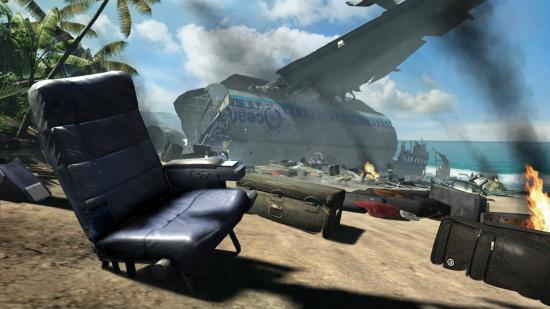 | | There's no reason to become alarmed and we hope you enjoy the rest of your flight. By the way, is there anyone on board who knows how to fly a plane? |
Their voices, on the other hand, leave much to be desired. No doubt the voice talent will be one of the greatest strikes against the game in the minds of fans, and I have to agree. It’s a shame that the designers were willing to put so much effort into recreating the universe with such accuracy but somehow couldn’t muster the will to sign on all of the show’s regulars to do some simple voiceovers. While many of the smaller characters were voiced by the actual actors (Desmond, Claire, Sun, and “the others”), all of the major characters were given some of the worst impressionists of all time. Apparently, they found an intern to voice Kate, Huckleberry Hound to voice Sawyer, and some random guy off the street to voice Charley, Hurley, and Jin. The only fake voice that’s convincing is Jack’s, although Sayid’s is almost passable. Still, the most disappointing is easily Locke—due to his enormous role throughout the game—as he sounds like an Indian chief who just left the reservation.
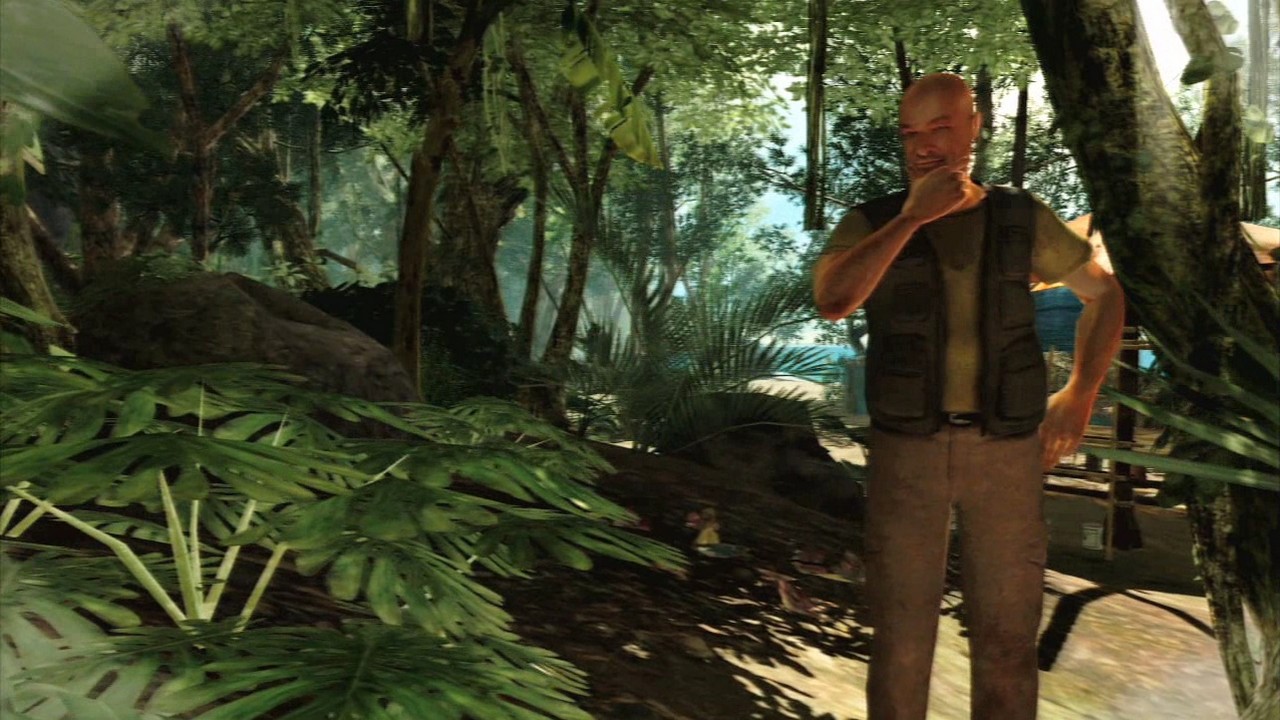 | | Here we have Chief Smiles With An Orange cleverly disguised as boxman John Locke |
But what the game lacks in vocal talent it more than makes up for in sound and music. The same people who score the show score the game, and it definitely shows. Many familiar themes are played throughout the game, and Via Domus is even given its own which matches perfectly with the Lost mood. Additionally, the sound is as good as any game out there, as it puts you deeper into the universe than even the show can. For example, the sound of the smoke monster coming at you through the forest is, in a word, intense.
There’s also a lot of neat touches, like the “Previously on Lost” segments at the beginning of each of the seven “episodes” of the game, and the opening “LOST” title coming at you, highlighting how much effort the designers put into making the game feel like an extension of the show. Presentation-wise, the game is definitely a success. Unfortunately, I can’t say the same for the gameplay.
[Presentation: 36/60]
[Graphics & Sound: 7/10]
[Music: 10/10]
[Replay: 5/15]
[Extras: 6/15]
[Fun: 8/10]
|
|
GAMEPLAY
As I mentioned in my review of Zack & Wiki, there aren’t enough pure adventure games out there, and the genre is a natural fit for Lost. Thankfully, Via Domus is, for the most part, a third-person adventure game. There is a lot of emphasis on puzzles, conversational clues, and mystery, with the odd action sequence thrown in to keep you on your toes. However, while the game does try to do a lot of different and fun things, it doesn’t do any of them very well.
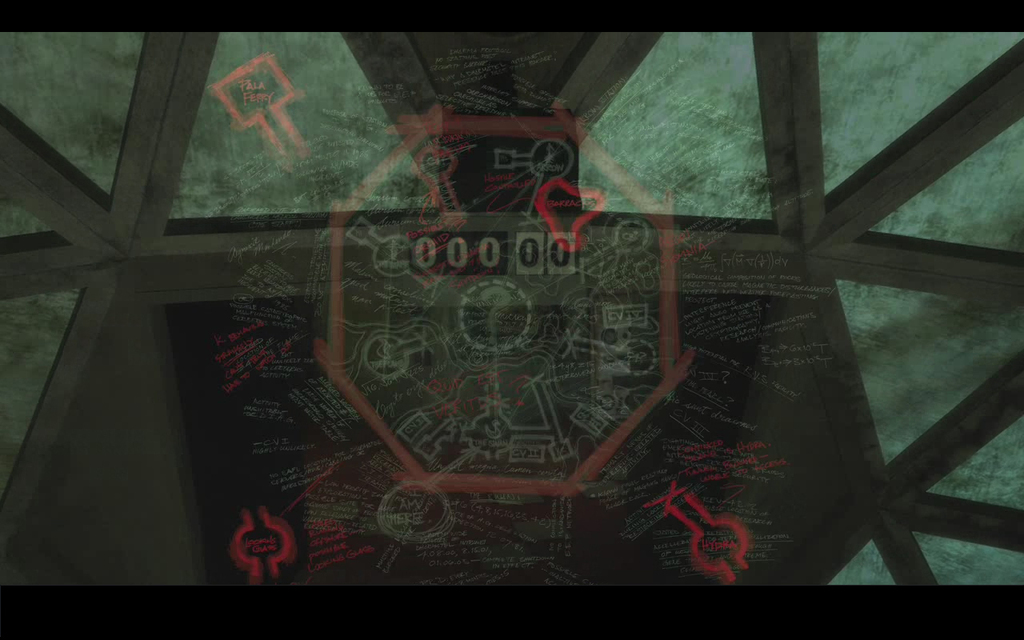 | | This is the closest thing you'll get to a map, but you won't actually get to use it |
The only part of the game that is even remotely original is the flashback mechanic. Flashbacks play a central role in the show, so it is only natural that they would play an equally important role in the game. While the designers could have easily copped out and made the flashbacks cutscenes, they chose instead to make them playable, although I use the term loosely. You start with a fuzzy memory, represented with a torn up photograph, that you have to literally put together by snapping the same photo in real-time. At first, this is a very simple gimmick, but in the later flashbacks, it does become more challenging. Once you’ve pieced the memory together, you can actually experience the full flashback, and aside from collecting a few bits of trivial background information, there’s not a whole lot to do except initiate a conversation to start a cutscene. Back on the island, you use the knowledge you gained from the flashback to progress, which is pretty nifty.
But, like the rest of the game, it’s all pretty linear and restrictive. You can’t really explore the island, which is disheartening at first, but when you get to a few of the later “episodes” of the game, it’s not a significant problem, since you can walk all over the Swan station and several other great areas that I don’t want to spoil for you. Still, there’s no freedom in the game to go off the beaten path, and it’s strange to have a game set on an island with a compass as a major item that doesn’t have any real maps. Once I got to walk on the beach, I really wanted to hike along it and find the wire or Sayid’s picnic setup, but learned all too quickly that you’re restricted to a very small segment of land. There are a couple of easter eggs, like the Staff and Pearl stations, but if you’re hoping to go look at the Nigerian plane, see the four-toed statue, play golf, or wander off in search of Adam and Eve, you’ll be sorely disappointed.
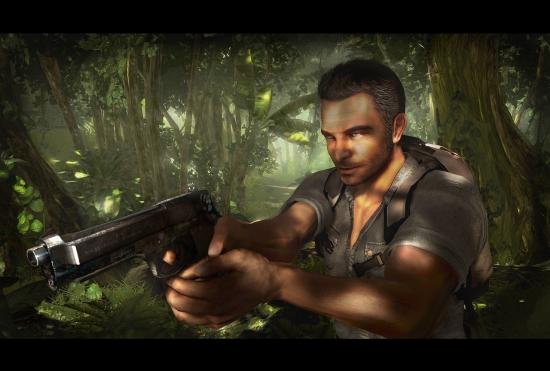 | | Elliot may think he's Chris Redfield, but since the story doesn't get to the zombie season, all he does with this gun is pose |
You are eventually given a camera, though, which is mostly used to unlock achievements and extras by photographing things like the numbers on the hatch. It’s a fun toy, and through its lens, the graphics are twice as impressive as they were before, but it’s unfortunate you can’t save a few snapshots or even peruse your digital memory.
There’s also a neat trading aspect to the game, where you can trade things like coconuts and books with Sawyer (and a few other people) for things like torches, ammo, and fuses. This is a pretty ingenius tie-in to the show, and one of my favorite mechanics. Unfortunately, as there are exponentially more things like coconuts and Apollo bars laying around than there are things you need to trade for, it’s not a terribly useful one.
Along the same lines, the conversation trees, while certainly not ground-breaking, are effective at serving their purposes. However, the option to talk about items in your inventory is completely useless, and it seems really bizarre that, while forty-eight people survived the crash of Oceanic 815, there are only three or four of them on the beach at any given time.
The action sequences aren’t bad, but there are only a few of them. The game seems to put emphasis on getting a gun and stocking up on ammo, but you can easily finish the game with only three bullets, negating the weapon’s usefulness. This is okay, since a Lost shooter would be a strange thing indeed, but it could have been incorporated better in certain places like the caves, where the game comes awkwardly close to Resident Evil territory. The hardest action sequence by far involves both dynamite and the smoke monster, and perhaps that’s the only part of the game where the difficulty is unnecessarily ramped up.
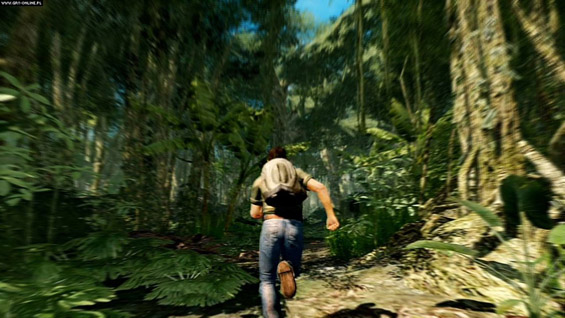 | | Don't run with dynamite unless you want to wind up like poor Dr. Artz |
There are also two chase sequences, which depend on timed jumps and slides, and they’re good, but right before the harder of the two—where one mistake forces you to start over—you are given a long cutscene to introduce the “episode.” This is a problem, because every time you die and start over again, you have to watch the cutscene over, with no option to skip it. I don’t mind dying frequently, but being forced to watch the same long cutscene over and over again is infuriating.
The puzzles, additionally, are far too limited. There are only two types of puzzles: electrical puzzles involving fuse-boxes and quick logic progressions typed into Dharma computers. The fuse puzzles are clever and well-done, but it seems pretty ridiculous that every puzzle on the island would be essentially the same. Typing the numbers into the Swan computer as the timer ticks down is exciting, but the other computer parts are pretty standard and uninspired (the kind of stuff you could find in classic text-based adventure games from the early 80s, which might have been what they were going for since the computers in the game are from the same time period).
Having such a limited selection of puzzle types in an adventure game is as unforgivable as the lack of exploratory freedom, and it emphasizes how sloppy the overall game design is. The primary audience here is clearly Lost fans, not gamers, and if you’re both like me, you’ll find yourself a torn person when discussing this game.
STORY
The story of the game is definitely its strong suit. You play as Elliot Maslow, a photojournalist on the doomed flight of Oceanic 815 who has lost his memory in the crash. If Elliot were a character on the show, his story would be too cheesy to work, but as a video game protagonist, he works perfectly. Still, the level of mystery, intrigue, and shady morality surrounding his backstory puts him shoulder-to-shoulder with the likes of Kate and Sawyer, and how his post-crash island experience weaves in and out of the show’s narrative makes him far more interesting as a character than Nikki and Paulo ever were.
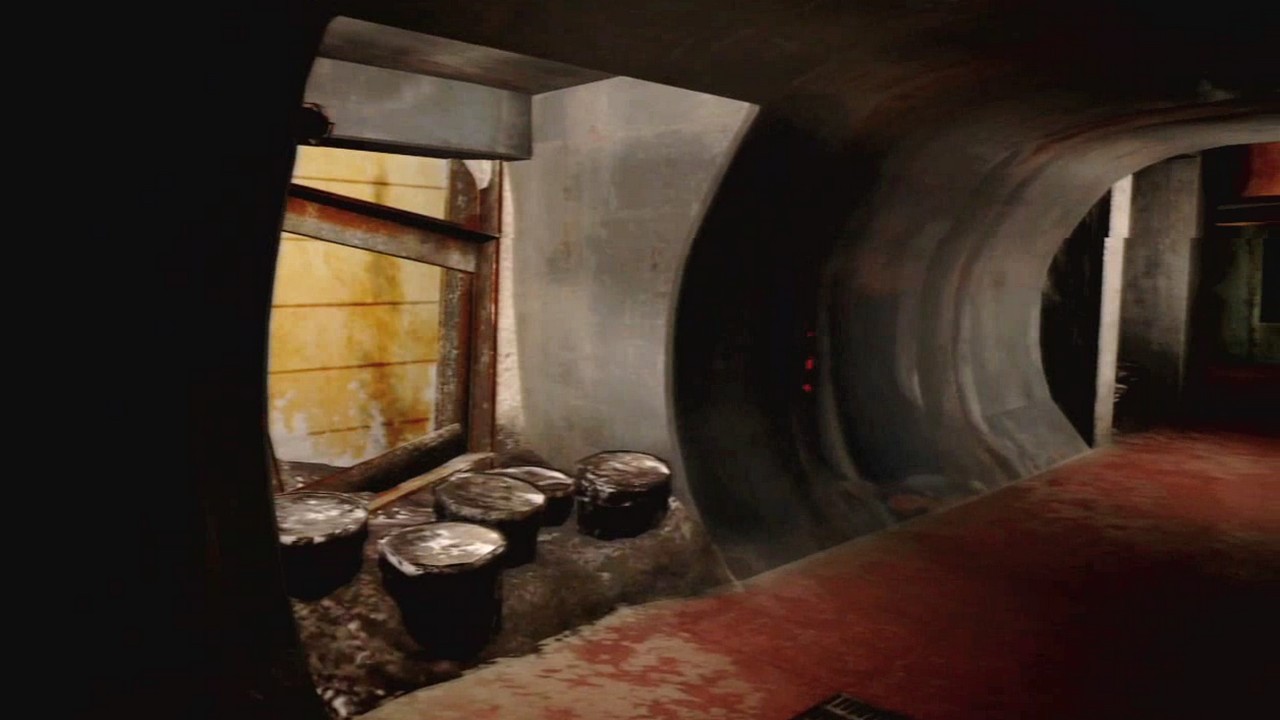 | | All I'll say is that Ben may not have been lying about those two giant hamsters providing all the electricity |
No major mysteries from the show are solved in Via Domus, and that’s not a bad thing. However, if you really want to see what was behind the concrete in the Swan station, or if you’re a big enough fan to know who Thomas Mittlewerk is, you’ll be pleasantly surprised. Also, with a few exceptions, the overall continuity of the show, which is downright sacred to the fans, is kept blessedly intact.
***SPOILER WARNING!***
But there are a few small problems. For instance, your trip to the Flame station makes absolutely no sense. For some reason, the entrance to the underground portion of the station can be found on top of a big cliff inside the sonic fence. Um, what?! In addition, you get thrown into the armory immediately upon the opening of the hatch, when in the chronology of the show, it was definitely still full of guns. Also, it seems a little odd for certain characters like Sawyer and Locke to fall so completely into their post-crash mentality the night of the crash, when in the show, they spend the first few episodes getting a feel for how to act. And I’m pretty sure the explosion at the Black Rock when the others try to kidnap Jack and Kate would have come up at some point in the show.
On that note, I’ve read reviews that talk about how incredibly awesome the ending is, but I have to admit I didn’t like it. It seemed trippy for trippy’s sake, with no possible way to logically explain it. Especially in light of the revelations in the most recent episode of the show, “The Constant,” I don’t think this particular ending—which is rumored to have been envisioned by Damon Lindelof himself—can be explained at all. At least the trippy plot twists in the show seem like they have a reason.
***END SPOILER WARNING!***
OVERALL
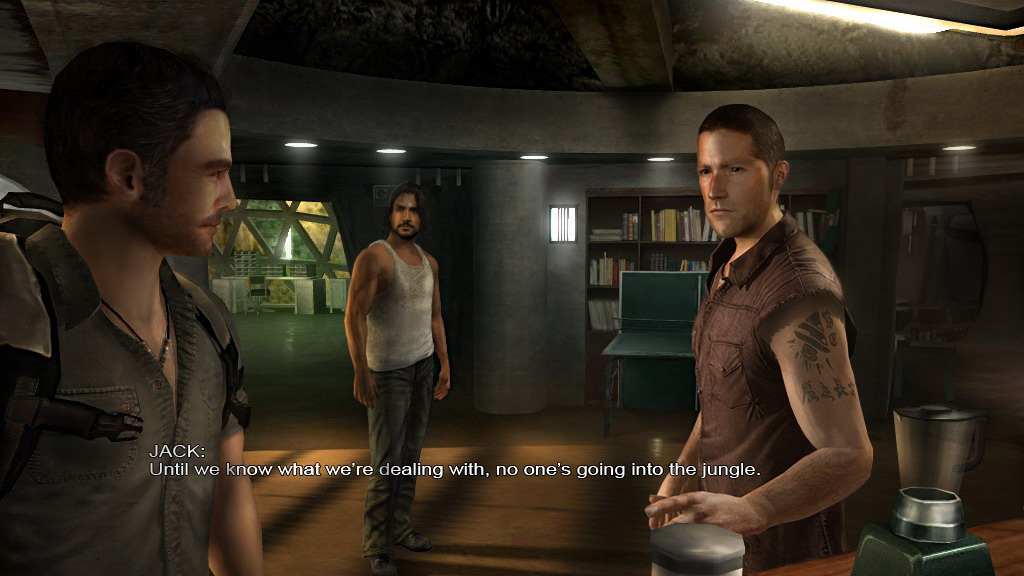 | | Bottom line: if you don't know who the guy on the right is or where they are, don't bother with this game |
The designers clearly made a choice to serve the fans of the show. For this reason, it’s not a game for anybody else. The plot will be infuriatingly confusing to anybody not familiar with the show (for instance, there’s no explanation given as to why Sun suddenly starts speaking English halfway through the game), and the random objects thrown at you like the Dharma van or the numbers will have no meaning.
For this reason, Lost: Via Domus is great fan service. It doesn’t waste time offering tedious explanations to events outside of Elliot’s story or introducing every single character, and it doesn’t insult your intelligence by telling you who Alvar Hanso is. However, because it omits so much from the show, it will leave the fan wanting, especially since the game is painfully short, linear, and small. There’s not much to it, but what’s there is a great love letter to the fans.
FINAL TALLY
STORY: 18/20
GAMEPLAY: 7/20
PRESENTATION: 36/60
BONUS POINTS: 1
(for fan service)
TOTAL SCORE: 62/100 |
|
-e. magill 03/01/2008
|
|